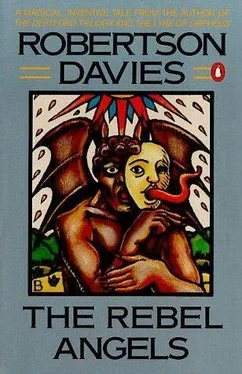Robertson Davies - The Rebel Angels
Здесь есть возможность читать онлайн «Robertson Davies - The Rebel Angels» весь текст электронной книги совершенно бесплатно (целиком полную версию без сокращений). В некоторых случаях можно слушать аудио, скачать через торрент в формате fb2 и присутствует краткое содержание. Жанр: Триллер, на английском языке. Описание произведения, (предисловие) а так же отзывы посетителей доступны на портале библиотеки ЛибКат.
- Название:The Rebel Angels
- Автор:
- Жанр:
- Год:неизвестен
- ISBN:нет данных
- Рейтинг книги:5 / 5. Голосов: 1
-
Избранное:Добавить в избранное
- Отзывы:
-
Ваша оценка:
- 100
- 1
- 2
- 3
- 4
- 5
The Rebel Angels: краткое содержание, описание и аннотация
Предлагаем к чтению аннотацию, описание, краткое содержание или предисловие (зависит от того, что написал сам автор книги «The Rebel Angels»). Если вы не нашли необходимую информацию о книге — напишите в комментариях, мы постараемся отыскать её.
The Rebel Angels — читать онлайн бесплатно полную книгу (весь текст) целиком
Ниже представлен текст книги, разбитый по страницам. Система сохранения места последней прочитанной страницы, позволяет с удобством читать онлайн бесплатно книгу «The Rebel Angels», без необходимости каждый раз заново искать на чём Вы остановились. Поставьте закладку, и сможете в любой момент перейти на страницу, на которой закончили чтение.
Интервал:
Закладка:
Hollier and I had nobody to blame but ourselves. McVarish was in charge of paintings and objects of art, which can be heavy and clumsy, so he could hardly have been expected to do the work by himself. But Hollier was in charge of books, and he was the kind of man who hates to have anyone else touch a book until he has examined it thoroughly, by which time he might as well put it in its final place. Except that there rarely is any final place for books, and people whose job it is to sort them seem always to be juggling and pushing them hither and yon, making heaps as tall as chimneys on the floor, when the space on tables has been filled. My job was to sort and arrange the manuscripts and portfolios of drawings, and it was not work I could very well trust out of my own hands. Indeed, I wanted no help.
None of us wanted interference, for a reason we never completely acknowledged. Cornish's will had included a special section naming in detail what was to go to the National Gallery, the Provincial Gallery, the University Library and the College of St. John and the Holy Ghost. This list had been made two or three years before his death. But between the making of the list and his last days he had continued to buy with his usual avid recklessness. Indeed, large packages continued to arrive after he was buried. Thus there was quite a lot of stuff that was not named in the will, and much of it was of the first quality. But the will had a clause that provided that each of his executors was to be free to choose something for himself, provided it was not already named as a bequest, as a recognition of the work he had undertaken and as a gift from a former friend. All else became part of his estate, under Arthur Cornish's care. Clearly our choice was to be made from these most recent acquisitions. I suppose our behaviour could be described as devious, but we did not want the galleries and the libraries casting a possessive eye over everything that was available, because we did not want to have to argue, or perhaps wrangle with them as to what we might take. Our right was indisputable, but the high-minded covetousness of public bodies is so powerful and sometimes so rancorous that we did not wish to arouse it needlessly.
We kept the librarians and archivists and curators at bay, therefore, until after our final meeting; once that was over they could strip the place to the walls.
I was first on the spot on that great November Friday, and next to come was Urquhart McVarish. This gave me the chance I needed to do the job I dreaded.
"All the stuff in my department is accounted for," I said, "except for one thing that is mentioned in a memo of Cornish's that I can't quite figure out. He speaks of a manuscript I haven't been able to find."
Urky looked inquiring, but non-committal.
"Here it is," I said, producing the pocket-book from one of the boxes that had been packed up for the University archivists.
"You see here, he speaks of what he calls a "Rab MS" that he lent to "McV." last April. What would that have been?"
"Haven't a clue," said Urky.
"But you are obviously McV. Did you borrow something from him?"
"I'm not a borrower, because I hate lending myself."
"How do you explain it?"
"I don't."
"You see it puts me in a spot."
"There's no sense in being too pernickety, Darcourt. Counting all the books and manuscripts and things there must be thousands of items here. Nobody in his senses would expect us to check every scrap of paper and old letter. In my department I've lumped a lot of things together under Miscellaneous, and I presume you and Hollier have done the same. With a man like Cornish, who was fiercely acquisitive but utterly unsystematic, things are bound to be mislaid. Don't worry about it."
"Well, but I do, rather. If there's a manuscript somewhere that ought to be here, I have an obligation to recover it and see that the Library gets it."
"Sorry I can't help you."
"But you must be McV."
"Darcourt, you're pressing me in a way I don't much like. Are you by any chance suggesting I've pinched something?"
"No, no; not at all. But you see my position; I really must follow up this note."
"And on the basis of that, taken from a lot of scribbles that seem to be phone numbers and addresses, and reminders of God knows what past events, you are pressing me rather forcibly. Have you traced all the rest of the stuff in all this mess of notebooks?"
"Of course not. But this one is not like the rest; it says he lent something to you. I'm just asking."
"You have my word that I don't know anything about it."
When somebody gives you his word, you are supposed to take it, or else be prepared to make an unpleasant fuss. There is a moment when one should be bold, but I hesitated and the moment passed. In these confrontations the stronger will prevails, and whether it was that I had eaten the wrong things for lunch, or because I am naturally a hater of rows, or because Urky's Sheldonian type has the edge on my Sheldonian type in such matters, I lost my chance. I was resentful, but the code which is supposed to govern the dealings of scholars prevented me from saying any more. Of course I was uncomfortable, and my conviction hardened that Urky had kept the Rabelais manuscript Hollier had described. But if I couldn't make him disgorge it by the sort of inquiry I had made, was I now to denounce him and demand – what? A search of his house? Impossible! An appeal to Arthur Cornish? But would Arthur understand that a misplaced manuscript was a serious matter, and if he did would he be willing to pursue it? Would Hollier stand by me? And if I went through all this uproar, and the manuscript finally reached the Library, would Hollier and his Maria ever get their hands on it? If McVarish produced it, might he not take the important letters from the pocket in the back of the cover, and deny any knowledge of them? All the muddle of arguments that rush into the mind of a man who has been worsted in an encounter streaked through my brain in a few seconds. Better face the fact: I had backed down, and that was all there was to it. Urky had won, and I had probably made an enemy.
More unpleasantness was avoided because the man from the lawyer's office and the man from Sotheby's arrived, and the secretary Cornish had put on the job, and shortly afterwards came Hollier and Arthur Cornish. Necessary business was completed: the Sotheby representative swore that the valuation his firm had prepared was in conformity with modern estimates of such things; we three swore that we had carried out our duties to the best of our abilities, and that was that. It was all eyewash, really, because the only way to find the current value of Cornish's art collections was to sell them, and our abilities as executors rested on Cornish's opinion of us, rather than on any professional experience. But documents were necessary for probate, and we did what was necessary. The lawyer and the Sotheby man went away, and the moment came that we had all been waiting for.
"Now gentlemen, what are you going to choose?" said Arthur Cornish. He looked at McVarish, who was the oldest.
"This, for me," said Urky going to a table in a far corner of the room and putting his hand on a bronze figure that stood with a huddle of similar pieces. But though similar, they were not of equal value. Urky had chosen the best, and why not?
It was a Venus; the Sotheby man had identified it as a Canova, and a good one.
I was grateful that Urky had in this way set the tone for Hollier and myself; what he had chosen was unquestionably valuable, but among Cornish's treasures it was not conspicuous. There were obviously better things. It was a substantial, but not a grabby, choice.
"Professor Hollier?" said Arthur.
I knew how much Hollier hated having to reveal his choice. There was about it too much the air of the child who is taken into a candy-shop on its birthday and told to choose, under the eye of indulgent adults. For such a private man this was deeply distasteful. But he spoke up. "These books, if nobody objects."
Читать дальшеИнтервал:
Закладка:
Похожие книги на «The Rebel Angels»
Представляем Вашему вниманию похожие книги на «The Rebel Angels» списком для выбора. Мы отобрали схожую по названию и смыслу литературу в надежде предоставить читателям больше вариантов отыскать новые, интересные, ещё непрочитанные произведения.
Обсуждение, отзывы о книге «The Rebel Angels» и просто собственные мнения читателей. Оставьте ваши комментарии, напишите, что Вы думаете о произведении, его смысле или главных героях. Укажите что конкретно понравилось, а что нет, и почему Вы так считаете.












